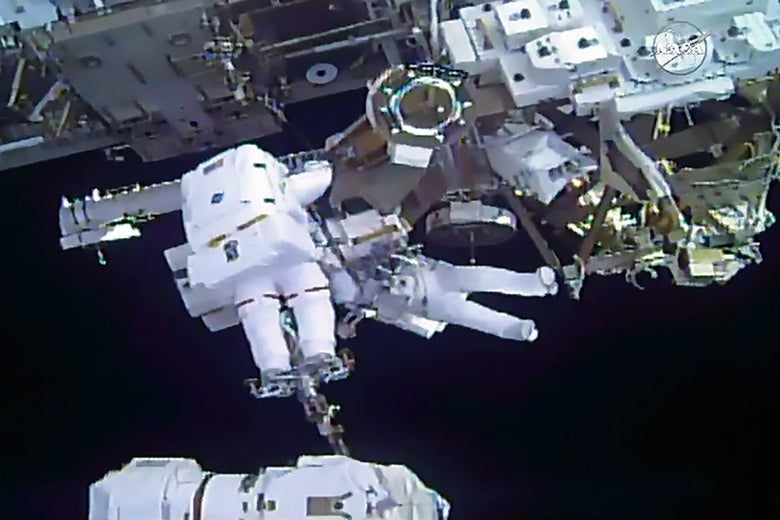
Spacewalkers transfer a spare robotic hand to a long-term stowage area on the International Space Station.
NASA/AFP/Getty Images
In space, no one can hear you sob.
The link between extraterrestrial exploration and emotional distress has been well-documented for decades, though those feelings aren’t always about what people experience in space. Buzz Aldrin, for one, lived with depression for years after walking on the moon, partly because that accomplishment outstripped so much of what he experienced after. Space travel, however, presents psychiatric risks of its own, especially over the course of protracted missions in cramped quarters.
Enter an ongoing research project—funded in part by a NASA grant—at Florida Polytechnic University that would use technology embedded in astronauts’ suits to evaluate their well-being and adjust conditions accordingly. According to a press release from the university, the product the researchers are attempting to develop—which it calls Smart Sensory Skin—would monitor an array of biometric data points, including “pulse rate, blood pressure and joint angles.”
That information would then be fed wirelessly to other systems in the astronauts’ environment, allowing a space station or craft to dynamically adjust lighting, oxygen levels, and other factors. In the process, it might be possible to anticipate the needs of astronauts before they become issues, potentially staving off some of the psychological challenges associated with long stints away from Earth. It’s of a piece with work that’s long been underway at NASA, including experiments into the effects sleep-wake cycles and light exposure during spaceflight.
Much of the presscoverage around the project has picked up on Florida Polytechnic’s own characterization of its proposed product as a “happy suit.” While that term suggests that the technology itself would somehow counteract depression, it seems more accurate to suggest that it’s an extension of biometric monitoring already available to civilians here on Earth. Think, for example, of the heart-rate monitors already embedded in many fitness trackers, or the way that Apple Watches encourage their wearers to periodically stand.
Indeed, it’s entirely possible that the Smart Sensory Skin project will have terrestrial implications, even if it doesn’t accompany astronauts to Mars. There is a long history of commercial applications for space technologies, from plant preservation to shirting fabrics. Here, we might imagine wearable sensors that communicate with other devices in smart homes, optimizing our terrestrial habitats to better suit our needs. That’s a promising prospect, and also a potentially troubling one, given the privacy implications of such innovations. Further, it’s entirely possible that automatic personalization could effectively alienate us from our environments by fixating on what we supposedly need rather than what we want and thereby stripping us of our agency. It’s easy to imagine similar problems arising off world as well.
Even in space, the most advanced space suits can only do so much. It’s hard, for example, to imagine them helping crew members work through the sort of interpersonal issues that astronauts sometimes experience, especially when cultural differences make it difficult for them to connect with one another, an issue that reportedly arose on the Mir space station. Similarly, other problems, such as the hallucinations that affected Apollo astronauts may be, as Smithsonian magazine notes, “simply a side effect of being in space.” But while the Smart Sensory Skin project may not represent a giant leap, it still has the potential to be a valuable, if small, step in the right direction.
https://slate.com/technology/2018/02/smarter-space-suits-might-help-astronauts-with-depression.htmlBagikan Berita Ini














0 Response to "Could Smarter Space Suits Help Astronauts Stave Off Depression?"
Post a Comment